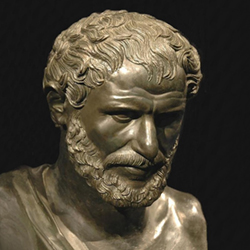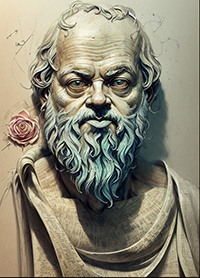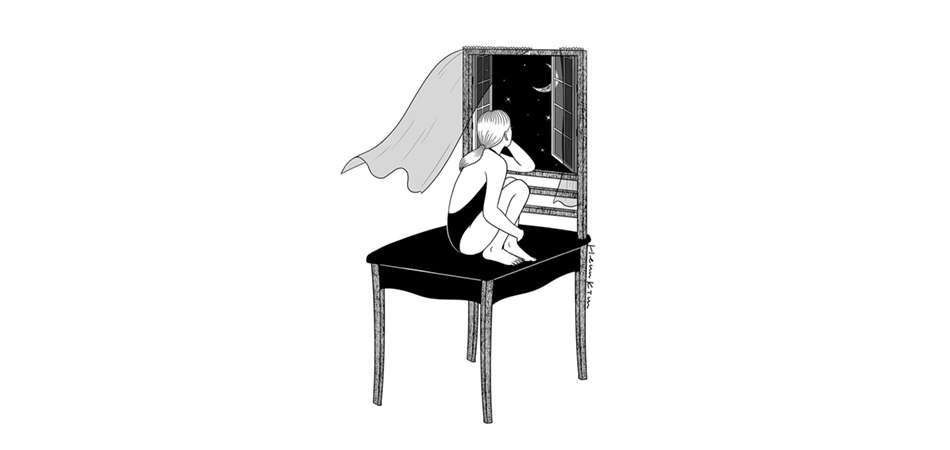The adventure began more than one hundred years before Socrates’s birth, in the sun-baked commercial town of Miletus on the coast of Asia Minor, or modern-day Turkey. In about 585 BCE, a man named Thales amazed his fellow Milesians by correctly predicting an eclipse of the sun.
A few years earlier or later (the record is scanty and unclear), Thales also made a trip to Egypt, where he calculated the height of a pyramid by measuring the length of its shadow at the same time of day that his own shadow equaled his actual height. With these two feats, Thales signaled a major change in Greek thinking and world thinking. A new, rational way of understanding reality was born, as opposed to one tied to myth or religious ritual— as still prevailed in two much older civilizations, Egypt and Babylon. It was a major shift, and a radical one. Quite suddenly, Greeks of the sixth century BCE lost faith in the ancient legends about the origins of the world told by Homer, Hesiod, and other early poets; about how Uranus had fathered the Titans with Mother Earth and how the Titans fought and lost to Zeus and the other gods for dominance of the world. They no longer seemed believable; they even seemed deliberately misleading. Instead, the question that every Greek sage before Socrates wanted to answer was: “What is real about reality?” More specically, what is the stuff from which everything else in the world is made?
Thales and his fellow pre-Socratics, as they are called, came up with a variety of answers, some more speculative than others. Only fragments of their words have survived. Reconstructing their thought process involves a certain amount of guesswork. But almost all agreed that water, air, fire, and earth were the key constituents of material reality—although which came first, or which held sway over the others,* was a matter of long and intense debate. Thales himself opted for water as the first element from which all things, even the sun and stars, were made (a notion he may have picked up from Egyptian cosmology). Anaximenes proposed air instead. Democritus and Leucippus were willing to take another tack. They insisted that all four elements, and everything else, were actually made up from tiny indivisible particles they called atoms—an astonishing anticipation of the modern atomic theory to come twenty-four centuries later. At the time, however, the atomists were only one more voice in the fierce debate over the true nature of reality, which still raged when Socrates was growing up. In the end, two theories stood out, each in direct opposition to the other. As it happened, both would decisively aect Socrates’s views and Plato’s.

Heraclitus is the wild card of the pre-Socratic pack. Other Greek thinkers wanted to find some fixed principle around which a stable, predictable way to understand reality could be built (especially the Pythagoreans, about whom we will say more later). Heraclitus threw out the whole concept of stability. His mottoes “War is the father of all things,” “Strife is justice,” and “Good and evil are one” show just what he thought of most men’s desire for a peaceful, harmonious life and a harmonious universe. Instead of stability, Heraclitus said, there is only change: ceaseless, relentless, and without end. In the desperate watercourse of existence, any notion we have of permanent or fixed values, even of our own body, is pure illusion. Instead, everywhere we look, everything we see is in constant flux and change. “The world is a living fire,” Heraclitus is supposed to have said, while his most famous sayings of all, “All things change” (Panta rhei) and “You cannot step into the same river twice,” make him the father of relativism: a relativism that teeters on the brink of embracing chaos.
On the brink, but not quite. The one principle Heraclitus did embrace was that of the Logos, which can be variously translated as the Word or the Spirit or the Reason or even the Way—in fact, the parallels between Heraclitus’s Logos and the Chinese Tao are striking. By following the Logos, Heraclitus armed, which he saw as a kind of spark or breath (psyche in Greek) that resides in each of us as individuals and also permeates the world, we can achieve peace. For Heraclitus, the discovery that nothing is permanent was meant to be a source not of nihilistic despair but of understanding, as we come to realize that the physical reality around us—buildings, trees, mountains, other people, the entire works—is not actually “real” at all, but merely the playing out of opposites, “an attunement of opposite tensions, like a bow or lyre.”
Heraclitus’s theory of the Logos, his cryptic sayings (which resemble those of the famous Oracle at Delphi, revealing how much philosophy and religion were still intermingled), and his love of paradox earned wide respect, if not exactly acceptance. They were so clever, in fact, that the only way to answer the Heraclitean riddle of existence seemed to be to challenge its entire foundation. This another thinker from one of the Greek cities in southern Italy, Elea, proceeded to do during Socrates’s own lifetime. His name was Parmenides, and in answer to Heraclitus’s claim that everything changes, Parmenides countered by arguing that nothing changes. Far from permanency being an illusion, as Heraclitus claimed, it is change that is the illusion. To do this, Parmenides scrapped the whole elusive search for the rest of the four elements. Everything that exists, he argued—air, fire, and the rest—forms a single perfect whole. We watch the boy grow into a young man and then grow old and die, but it is still the same man. We watch the leaf on the tree turn from green to brown, but it is still the same leaf. Even when it falls to the ground and withers and crumbles, it never becomes nothing. It is still part of a reality that to our imperfect eyes and ears seems full of change and transformation, but which our reason realizes is never changing at all, since Being as such is all there is.
Try to think of Non-Being—that is, Nothing. It’s impossible: we live in a world in which “No Thing” can never exist. Hence our own experience teaches us that Being, which is the opposite of Nothing, actually unites everything: “complete, immovable, and without end.” Two powerful early thinkers; two mutually exclusive views of reality and the world. Yet it was Socrates’s, and Plato’s, great accomplishment to combine these two views into one and give birth to history great rational system. Socrates could do this because he starts with a different question from “What is real?” (although eventually he gets there, too). Socrates was the first also to ask: “What am I?” That question touched a deep chord in the culture of his time. Every educated Greek was familiar with the cryptic commandment issued by the Oracle at Delphi: Know thyself. Socrates was merely asking the next obvious question. What is the self? Who is this self who is observing all this change going on around me—or, if I happen to be Parmenides, the lack of change? Who is it who watches the birds and stars and changing seasons, who predicts eclipses and propounds theories about re and water, and who tames horses and trains dogs but greets other men as creatures like himself?

Socrates’s answer was astonishing. As far as we know, it was without precedent. It was that this “I” was a soul, something existing apart from my body, which was the true seat of normal waking intelligence and moral character: “my” fundamental identity, in fact. The word Socrates used for this soul, psyche, or “breath,” was a common one in Greek. Homer and other poets had used it for that part of the human being which survives death and passes into the underworld (Odysseus meets many of them, including those of dead friends, when he visits the underworld in the Odyssey). Still, Socrates gave the term a new status and importance. He may have borrowed Heraclitus’s notion of psyche as sharing the same essential nature as the Logos that permeates the world. In any case, it was a surprising twist for the thought of the time, which was still obsessed with unlocking the secrets of physical material reality. His fellow Greeks and Athenians were astonished to be told that this psyche was far more important than the body, and was the original home of man’s moral and intellectual faculties. All the same, the idea soon caught fire. Thanks to Plato, Socrates’s notion of the individual rational soul would become an integral part of Western thinking for the next two thousand years.
To be a human is to have a soul, Socrates and Plato tell us. Our soul is our true essence, our true identity. It is the soul that actively seeks to unlock the mysteries of the world, including the truth about reality. For nearly forty years before his death, Socrates wandered through the streets of Athens and its marketplace, the Agora, with his students in tow, talking and arguing. He showed them that the people of Athens, like people everywhere, were badly confused about their own values and virtues. Socrates had revealed generals who could not define courage (in the Laches), good friends who could not define friendship (in the Lysis), religious men who could not define piety (in the Euthyphro), and political experts who could not define justice (in the Gorgias). Even those who were paid to think about and teach such lofty matters, the so-called Sophists, some of whom made immense fortunes in Athens as political consultants, turned out to have no clearer idea of what constituted true wisdom than ordinary citizens. “It seemed to me,” Socrates would say, “that the people with the greatest reputations were the ones who were most decient [in true knowledge], while others who were supposed to be their inferiors were much better in practical intelligence.” No wonder Socrates roused the ire of his fellow Athenians!
Socrates had taken his students into the streets of Athens. Today, we just have to turn on the TV news or E! TV. Everywhere we look, we see mediocrity, stupidity, and base selfishness of the most embarrassing kind. But Socrates was compassionate as well as shrewd. If human beings do not understand the true nature of things, and principles like beauty and justice and goodness, he explained, then no one can expect them to live by those principles in their own lives. The world we live in, in other words, is a world created by our systematic ignorance—and our unwillingness to see things as they really truly are.

